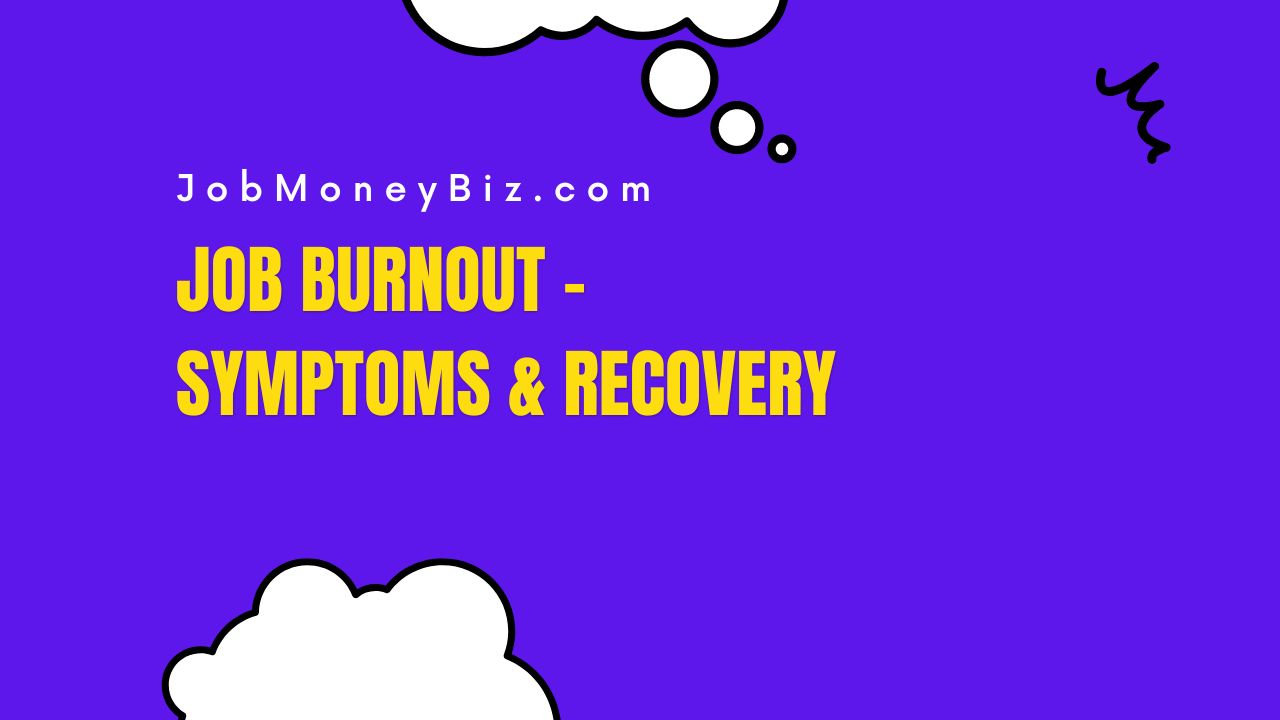Many of us are already aware of the job burnout issue caused by our jobs. It is important to identify the symptoms and go for recovery if it’s seen.
It’s quite natural that most of us feel that our job and environment shouldn’t lead to burnout and we want to succeed in our careers without burning out.
But only feeling the necessity won’t help and we need to plan and take action at the right time.
Even from the very day of joining a company, nowadays both freshers and experienced professionals should consciously know how to handle the stress and anxiety of a new job and act accordingly.
Maybe you’ve already experienced job burnout and its symptoms in your current role and are aware of the root cause and decided to start looking for a new job. Or maybe you’re doing just fine at this moment, but you’re aware of the dangers associated with job burnout and want to avoid it by taking the necessary actions right now.
There are also many who are already victims of job-related burnout and some signs of burnout are already evident in their behavior, attitude, activities, and health, but unfortunately, they are not fully aware of this and its root cause.
Job Burnout may be described as occupational failure or exhaustion because of excessive demands on energy, strength, or resources. This job burnout may be caused by tremendous work pressure, less job satisfaction, pathetic work-life balance, a demanding or unreasonable boss, office politics, biased appraisal, lack of trust, continuous fear of job loss, unhealthy competition, etc.

How to manage the Burnout issue to better our careers?
We can’t deny that burnout comes with negative effects on our mental, emotional, and sometimes even physical well-being. Some signs include exhaustion, feelings of negativity or apathy, and even physical manifestations such as headaches or insomnia. So naturally, we would want to find a job or role that will allow us to avoid these side effects.
There are some action items you can act upon as you prepare for your next job search to reflect on what it is you specifically need in order to prevent burnout—and to evaluate job profiles, managers, teams, location, terms and conditions of the job, and companies accordingly.
As the job world is quite volatile nowadays you can always keep your online profiles on Linkedin boosted. Also, take necessary actions to use social media like Twitter to keep your professional presence active.
Is it a wrong job that is causing burnout?
Burnout may be caused as you are in the wrong job (wrong for you).
We get allured by big designations, roles, and pay packages. Our education, knowledge, skillsets, and personality help us to land the job we want.
But, after a few days when we find out the actual nature of the day-to-day job, then many times we get a bit frustrated.
Hence, we need to introspect first to find out what kind of persons we are actually (as workers or employees) and what kind of jobs we can do without suffering burnout.
We have to remember that every challenging job wants us to come out of our comfort zone, and many times it’s quite helpful for our overall growth if we take up the challenge and stretch our known tested ability or limit.
So consider this point that you are expected to stretch your normal capability to some extent in almost every job when the situation demands so.
So here you have to think very wisely about what is your extended limit or in other words what additional load you can really take for a considerable period of time without being mentally and physically disturbed. You have to be honest about this. And if you find it’s already enough and you can’t anymore bear this burnout, then find out the root cause first and then take corrective action. And one of the possible corrective actions may be looking for a new job. Let’s discuss more in the following sections.

Introspect to find out the root cause of Burnout | What is the root cause of burnout?
You may ask a few questions to yourself and you need to answer honestly. Here, is a set of such questions to find out your current condition at your job. These will also help you to revisit your priorities and limit (regarding your job) based on your current job satisfaction level. And probably you will be able to find out the root cause of the job burnout you are suffering.
Questionnaire to Identify Your Own Causes of Burnout
- Do you have any location constraints? Often we need to stay away from our home and family for an extended period of time due to job transfers or client locations and we have very little scope to visit our family. And, this is a major cause of burnout. Do you have any such issues?
- Do you have any issues with frequent travel? Many jobs demand frequent travel and due to many reasons sometimes it becomes uncomfortable for us.
- Are you happy with the nature of your daily work? Are you getting job satisfaction? Are you trained enough to do this job? Do you find it difficult to do some specific as you are not trained in some specific tool or system?
- Is your job properly defined? Do you feel bogged down because of the unpredictability of the work items and tight delivery schedules?
- Do you like more freedom to deliver your best, instead of being micromanaged?
- Is your work being appreciated? Are you being properly mentored by your seniors?
- Do you have a healthy work-life balance? Can you spend some quality time after your daily work hours? Do you need to visit the office on the weekends on a regular basis?
- Do you really feel interested to go to your office every day and working there?
- Do you get enough rest? Are you physically strong enough to do your job? Are you too tired or feeling too weak to continue your daily job schedule? Are you aware of the reason?
- Are you motivated enough to contribute? If not what is stopping you to go ahead?
- Do you want to do something of your own (some kind of startup venture), but due to some reasons, you are suppressing that urge inside?
How to mitigate the causes of your burnout – Action Plan | symptoms & Recovery
To avoid burnout in your next company or role, it’s important to take a look at the questions above and determine which causes are relevant to the burnout you faced, and how to mitigate those.
Determining the root cause of your particular burnout is crucial. After all, unless you figure out why you’re feeling burnt out, you’re likely to repeat history even in a new environment.
If you are not liking to work in a remote location away from your home and family, then try to relocate to a nearby office location of your current company, if at all possible. Otherwise, you may think of a new job that will provide you with your preferred location. In the CV and in the job portals mention your location preference. Before accepting any offer you may double-check that your requirement is fulfilled and you have your base location mentioned in the offer letter. Also, check the details about the transfer policy.
If frequent travel is an issue then you can talk to your current employer about a role changeover. Otherwise, go for a job search and pay close attention to the JDs (Job Description). Mention in your CV your choice, so that the recruiters and interviewers come to know about your limitation or choice regarding frequent business trips.
If lack of job satisfaction is the root issue & if you decide to change your job then you may try to look for a company that is renowned for its good human resource management, and professionalism. Check if they provide required in-house training for new skillsets required. Also, find out if your new job profile matches your personal choice or liking like well-defined job responsibilities & goals, and a good work environment with well-maintained, transparent performance appraisal systems.
If the behavior of your immediate boss is an issue then you may talk to a more senior head in the practice or company, and ask for a transfer to a different team, or department, if you want. A fruitful discussion with a senior person may get your problems resolved or reduced to some extent.
If lack of any particular skillset is causing all issues, then you may ask for in-house training. Otherwise, invest some money to get the required training from some dependable training provider (online or offline). This will help you to be confident enough to do your job efficiently.
If lack of work-life balance is causing burnout then you need to find out authentic details about the work-life balance and overall work culture in your target company. Weekend office on all the weekends and overstaying every day may not be preferred for everyone, especially those who have gone through burnout issues. So, try to know about the work culture and team management practices well ahead before joining your next company.
In case, you want to do something of your own (start-up or some kind of business) instead of continuing your job, then consider all pros and cons, and then only decide.
If you are habitually too sensitive to the frictions of office or work life then you may invest some time to improve upon your thought process and your own way of taking everything in your work environment. A positive attitude and relaxed thought process may help in the long run.
When you search for jobs watch for the red flags in the job description (JD). JDs can provide clues as to whether a position may cause burnout in the future. If you see a job description that is vague or combines several roles into one, this could be a red flag. A well-written job description, on the other hand, will explicitly state where you’ll have enough space to contribute, such as whether you’ll be leading a team, serving as the point person for specific projects, or owning specific tasks.
You may ask Targeted Questions and Pay Attention in Interviews – Using your burnout experience, you can prepare a list of questions to ask the hiring manager and/or team at your interview. Questions like, “How do you measure success?” “What is the company’s policy toward WFH?” can help you to get an idea about the culture at a potential workplace. For additional information, you may ask about the company’s wellness program for the employees.
The body language and tone of the interviewer or hiring manager can also offer clues, and help you better understand how they feel about their own workload and their work culture. A collaborative interview process—one where candidates are encouraged to ask questions – is a good sign of things to come and you should utilize this opportunity to get your queries answered.
Also Read:
handling the stress and anxiety of a new job
keep your online profiles on Linkedin boosted
Twitter to keep your professional presence active
Anupam M is blogging on this site on different aspects of technology, job, and business. He is an experienced IT professional with an Engineering degree from a premier NIT. Know more


